
1918 - After the defeat of the Ottoman Empire in World War I, British forces occupy the oil-rich Ottoman vilayet (province) of Mosul, bringing extensive Kurdish-populated areas under British rule.
1919 - Mosul area is added to the new Iraqi state, which comes under a British mandate. 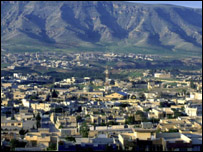
1920 - Treaty of Sevres, signed by the defeated Ottoman government, provides for a Kurdish state, subject to the agreement of the League of Nations. Article 64 of the Treaty gives Kurds living in the Mosul vilayet the option of joining a future independent Kurdistan.
1921 - Emir Faysal crowned king of Iraq, including Mosul.
Uprising
1923 - Shaykh Mahmud Barzinji rebels against British rule and declares a Kurdish kingdom in northern Iraq.
1923 - Kemal Ataturk's newly founded Turkish Republic gains international recognition with the Treaty of Lausanne. The Treaty of Sevres is not ratified by the Turkish parliament.
1924 - Sulaymaniyah falls to British forces.
1932 - Uprising in the Barzan region to protest at Iraq's admittance to the League of Nations, while Kurdish demands for autonomy are ignored.
1943 - Mullah Mustafa Barzani leads another uprising, and wins control of large areas of Arbil and Badinan.
1946 August - British RAF bombing forces Kurdish rebels over border into Iran where they join Iranian Kurds led by Qazi Mohamed, who founds an independent Kurdish state in Mahabad.
1946 - Kurdistan Democratic Party (KDP) holds its first congress in Mahabad. Within a few months, the "Mahabad Republic" collapses under attack from Iranian forces, and Mustafa Barzani flees to the Soviet Union.
1951 - A new generation of Kurdish nationalists revives the KDP. Mullah Mustafa Barzani is nominated president while in exile in the Soviet Union, but the real leader of the KDP is Ibrahim Ahmad, who favours close ties with the Iraqi Communist Party. 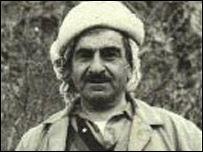
1958 - Overthrow of the Iraqi monarchy allows Kurdish nationalists to organise openly after many years in hiding. A new Iraqi constitution recognises Kurdish "national rights" and Mullah Mustafa Barzani returns from exile.
1960 - Relations between the Iraqi government and Kurdish groups become strained. The KDP complains of increasing repression.
1961 - KDP is dissolved by the Iraqi government after Kurdish rebellion in northern Iraq.
Autonomy granted
1970 March - Iraqi government and the Kurdish parties agree a peace accord, which grants the Kurds autonomy. The accord recognises Kurdish as an official language and amends the constitution to state that: "the Iraqi people is made up of two nationalities, the Arab nationality and the Kurdish nationality."
1971 August - Relations between the Kurds and the Iraqi government deteriorate. Mullah Mustafa Barzani appeals to the United States for aid.
1974 March - Iraqi government imposes a draft of the autonomy agreement and gives the KDP two weeks to respond. Mullah Mustafa Barzani rejects the agreement, which would have left the oilfields of Kirkuk under Iraqi government control, and calls for a new rebellion.
1975 March - Algiers Accord between Iran and Iraq ends Iranian support for the Kurdish uprising, which collapses. Barzani withdraws from political life.
1975 June - Jalal Talabani, a former leading member of the KDP, announces the establishment of the Patriotic Union of Kurdistan (PUK) from Damascus.
1978 - Clashes between KDP and PUK forces leave many dead.
1979 - Mullah Mustafa dies, his son Massoud Barzani takes over the leadership of the KDP.
Iranian involvement
1980 - Outbreak of war between Iran and Iraq. KDP forces work closely with Iran, but the PUK remains hostile to cooperation with Tehran. 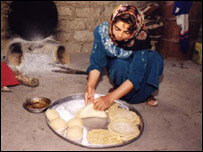
1983 - An Iranian counterattack opens a northern front in Iraqi Kurdistan. With support from KDP fighters, Iranian troops take the key town of Hajj Umran. Human rights organisations say Iraqi troops killed around 8,000 men from the KDP leader's home area of Barzan in revenge.
1983 - PUK agrees to a ceasefire with Iraq and begins negotiations on Kurdish autonomy.
1985 - Under increasing Iraqi government repression, the ceasefire begins to break down. Pro-Iraqi government militia men kill Jalal Talabani's brother and two nieces.
1986 - Iranian government sponsors a meeting reconciling the KDP and PUK. Now both major Kurdish parties are receiving support from Tehran.
1987 - Jalal Talabani and Massoud Barzani join forces with a number of smaller Kurdish factions to create the Kurdistan Front.
1988 - As the Iran-Iraq war draws to a close, Iraqi forces launch the "Anfal Campaign" against the Kurds. Tens of thousands of Kurdish civilians and fighters are killed, and hundreds of thousands forced into exile, in a systematic attempt to break the Kurdish resistance movement.
1988 16 March - Thousands of Kurdish civilians die in a poison gas attack on the town of Halabjah near the Iranian border. Human rights watchdogs and Kurdish groups hold the Iraqi regime responsible.
1991 March - After the expulsion of Iraqi troops from Kuwait in March 1991, members of the pro-government Kurdish militia, the Jash, defect to the KDP and PUK, but the uprising grinds to a halt and US-led forces refuse to intervene to support the rebels. Around 1.5 millions Kurds flee before the Iraqi onslaught, but Turkey closes the border forcing hundreds of thousands to seek refuge in the mountains.
Safe haven
1991 April - Coalition forces announce the creation of a "safe haven" on the Iraqi side of the border. International aid agencies launch a massive aid operation to help the refugees. Meanwhile, Jalal Talabani and Mas'ud Barzani open negotiations with Saddam Hussein on autonomy for Kurdistan.
1991 July - Talks continue in Baghdad, but Kurdish peshmerga forces take control of Arbil and Sulaymaniyah, in defiance of Iraqi government orders.
1991 October - Fighting between Kurdish and Iraqi government forces breaks out in earnest. Saddam Hussein fortifies the border of Iraqi Kurdistan and imposes a blockade on Kurdish areas. 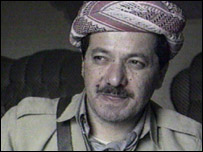
1992 May - Elections held in areas under Kurdish control give KDP candidates 50.8% of the vote, while the PUK takes 49.2%. The two parties are equally balanced in the new Kurdish government.
1992 September - Newly-established Iraqi National Congress (INC), which brings together a wide-range of Iraqi opposition groups, meets in Salah-al-Din in Iraqi Kurdistan. KDP and PUK representatives take part.
1994 May - Clashes between KDP and PUK forces spill over into outright civil war. The PUK captures the towns of Shaqlawah and Chamchamal from the KDP.
1996 May - A UN Memorandum of Understanding with the Iraqi government launches the "Oil-for-Food" programme. Under the agreement, 13% of the proceeds from Iraqi oil exports are earmarked for the three northern governorates, which are largely under Kurdish control.
1996 August - Massoud Barzani appeals to Saddam Hussein for help to defeat the PUK.
1996 September - With the help of Iraqi government troops, KDP forces seize the northern city of Arbil and take the PUK stronghold of Sulaymaniyah. A new KDP-led government is announced at the parliament building in Arbil.
1996 October - PUK forces retake Sulaymaniyah.
1997 January - PUK announces a new government based in Sulaymaniyah. Both the PUK and KDP claim jurisdiction over the whole of Iraqi Kurdistan.
1998 September - Jalal Talabani and Massoud Barzani sign a peace agreement in Washington, but government of the Kurdish region remains split between the two rival administrations.
2000 November - In a letter to the United Nations secretary-general, the PUK accuses the Iraqi government of expelling Kurdish families from Kirkuk.
2001 September - Fighting breaks out between the PUK and the Islamic fundamentalist group Jund al-Islam, later renamed Ansar al-Islam.
Moves toward unity
2002 June - PUK and KDP officials take part in joint discussions with other Iraqi groups aimed at coordinating the work of the opposition in the event of a US-led military campaign against Iraq.
2002 October - Joint session of the Kurdish parliament convenes in Arbil. KDP and PUK parliamentarians agree to work together during a "transitional session" until new elections can be held.
2002 December - Kurdish leaders attend a conference of the Iraqi opposition in London. KDP newspaper Brayati argues that the opposition's new-found unity embodies "the free will of the Iraqi people and the demands of the Iraqis for achieving a new democratic, parliamentary, federal and pluralist country". But disagreements among opposition groups over the composition of a "Follow-up and Coordination Committee" continue into 2003. 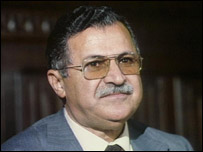
2003 February - US Secretary of State Colin Powell accuses Iraqi Kurdish Islamist group Ansar al-Islam of playing a pivotal role in linking Osama Bin Ladin's al-Qaeda network with the Iraqi regime.
2003 February - Kurdish leaders reject proposals to bring Turkish troops into northern Iraq as part of a US-led military campaign to oust Saddam Hussein. Anti-Turkish demonstrators take to the streets of Kurdish towns.
2003 February - Failure of a parliamentary bill allowing US troops to deploy on Turkish soil hits American plans to open a northern front against Iraq.
2003 3 March - KDP and PUK create a "joint higher leadership" in Iraqi Kurdistan, under the chairmanship of the two party leaders, Massoud Barzani and Jalal Talabani.
US-led campaign against Iraq
2003 20 March - US-led coalition forces invade Iraq and begin bombardment of Baghdad and other cities. Mosul and Kirkuk near the Kurdish enclaves come under heavy fire.
2003 22 March - Coalition forces launch Cruise missile attack on bases held by Ansar al-Islam in Iraqi Kurdistan. Dozens killed in the headquarters of the Islamic Group, an unrelated radical Islamist faction when a missile hits the Khormal area.
2003 23 March - Jalal Talabani greets the US-led assault on Iraq with a message marking the spring new year festival. The PUK leader said he hopes that "the dictatorial regime will end very soon and with the least casualties".
2003 27 March - Hundreds of US paratroopers land near Arbil, signalling the opening of a northern front in the war on Iraq.


